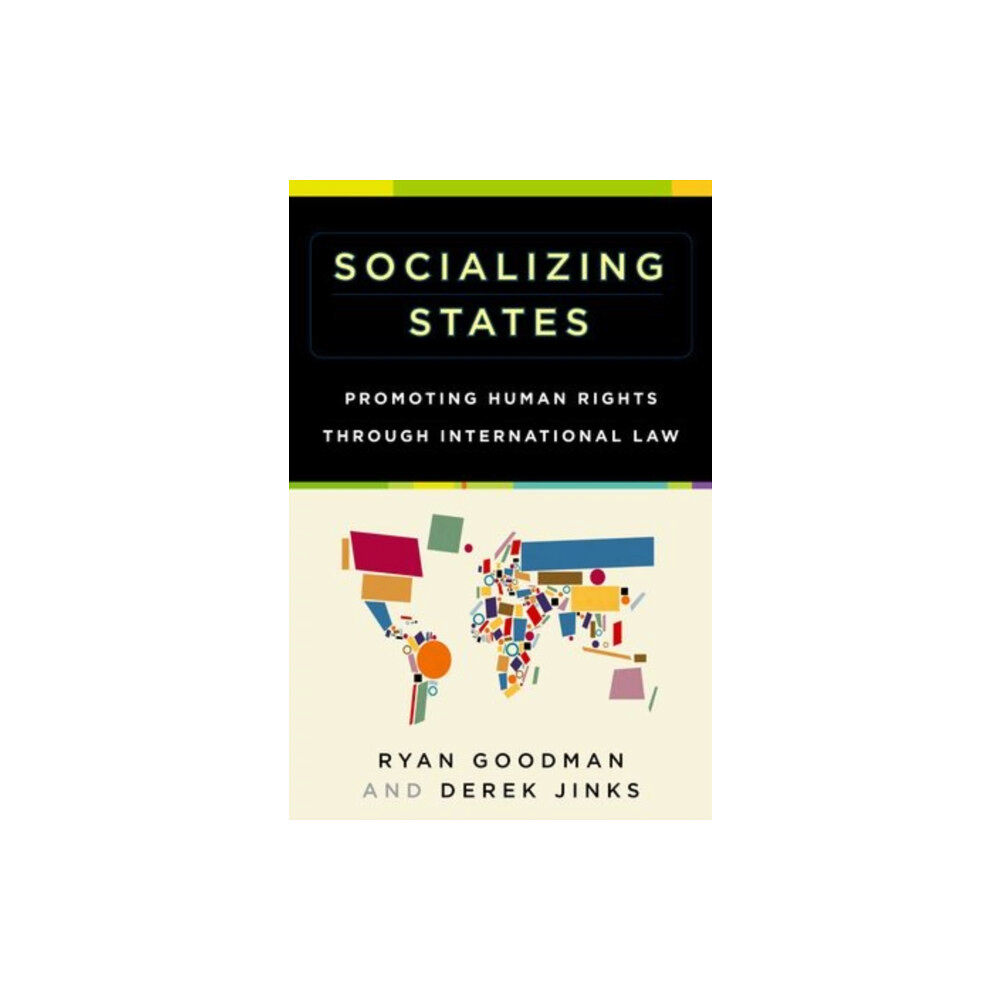- Hem
- Böcker
- Kurslitteratur
- Samhälle & Politik
- Socializing States (häftad, eng)

Socializing States (häftad, eng)
The role of international law in global politics is as poorly understood as it is important. But how can the international legal regime enco...
629 kr
675 kr
Slut i lager
- Fri frakt
Fri frakt över 299:-
Snabb leverans
Alltid låga priser
Produktbeskrivning
The role of international law in global politics is as poorly understood as it is important. But how can the international legal regime encourage states to respect human rights? Given that international law lacks a centralized enforcement mechanism, it is not obvious how this law matters at all, and how it might change the behavior or preferences of state actors.
In Socializing States, Ryan Goodman and Derek Jinks contend that what is needed is a greater emphasis on the mechanisms of law''s social influence--and the micro-processes that drive each mechanism. Such an emphasis would make clearer the micro-foundations of international law.
This book argues for a greater specification and a more comprehensive inventory of how international law influences relevant actors to improve human rights conditions. Substantial empirical evidence suggests three conceptually distinct mechanisms whereby states and institutions might influence the behavior of other states: material inducement, persuasion, and what Goodman and Jinks call acculturation.
The latter includes social and cognitive forces such as mimicry, status maximization, prestige, and identification. The book argues that (1) acculturation is a conceptually distinct, empirically documented social process through which state behavior is influenced; and (2) acculturation-based approaches might occasion a rethinking of fundamental regime design problems in human rights law.
This exercise not only allows for reexamination of policy debates in human rights law; it also provides a conceptual framework for assessing the costs and benefits of various design principles. While acculturation is not necessarily the most important or most desirable approach to promoting human rights, a better understanding of all three mechanisms is a necessary first step in the development of an integrated theory of international law''s influence.
Socializing States provides the critical framework to improve our understanding of how norms operate in international society, and thereby improve the capacity of global and domestic institutions to build cultures of human rights,
In Socializing States, Ryan Goodman and Derek Jinks contend that what is needed is a greater emphasis on the mechanisms of law''s social influence--and the micro-processes that drive each mechanism. Such an emphasis would make clearer the micro-foundations of international law.
This book argues for a greater specification and a more comprehensive inventory of how international law influences relevant actors to improve human rights conditions. Substantial empirical evidence suggests three conceptually distinct mechanisms whereby states and institutions might influence the behavior of other states: material inducement, persuasion, and what Goodman and Jinks call acculturation.
The latter includes social and cognitive forces such as mimicry, status maximization, prestige, and identification. The book argues that (1) acculturation is a conceptually distinct, empirically documented social process through which state behavior is influenced; and (2) acculturation-based approaches might occasion a rethinking of fundamental regime design problems in human rights law.
This exercise not only allows for reexamination of policy debates in human rights law; it also provides a conceptual framework for assessing the costs and benefits of various design principles. While acculturation is not necessarily the most important or most desirable approach to promoting human rights, a better understanding of all three mechanisms is a necessary first step in the development of an integrated theory of international law''s influence.
Socializing States provides the critical framework to improve our understanding of how norms operate in international society, and thereby improve the capacity of global and domestic institutions to build cultures of human rights,
| Format | Häftad |
| Omfång | 256 sidor |
| Språk | Engelska |
| Förlag | Oxford University Press Inc |
| Utgivningsdatum | 2013-10-03 |
| ISBN | 9780199301003 |
Specifikation
Böcker
- Häftad, 256, Engelska, Oxford University Press Inc, 2013-10-03, 9780199301003
Leverans
Vi erbjuder flera smidiga leveransalternativ beroende på ditt postnummer, såsom Budbee Box, Early Bird, Instabox och DB Schenker. Vid köp över 299 kr är leveransen kostnadsfri, annars tillkommer en fraktavgift från 29 kr. Välj det alternativ som passar dig bäst för en bekväm leverans.
Betalning
Du kan betala tryggt och enkelt via Avarda med flera alternativ: Swish för snabb betalning, kortbetalning med VISA eller MasterCard, faktura med 30 dagars betalningstid, eller konto för flexibel delbetalning.
Specifikation
Det finns tyvärr inga specifikationer att visa för denna produkt.
